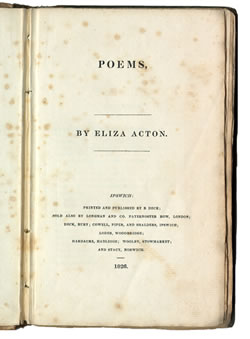 Look for information about Eliza Acton today, and you’ll find thousands of references to her 1845 cookbook, Modern Cookery for Private Families. She is generally acknowledged to have been the first writer of cookbooks to use the convention of listing all ingredients for a recipe at its start, making it far easier to follow the recipe through to the end. This, wrote one contemporary biographer, showed her organized mind.
Look for information about Eliza Acton today, and you’ll find thousands of references to her 1845 cookbook, Modern Cookery for Private Families. She is generally acknowledged to have been the first writer of cookbooks to use the convention of listing all ingredients for a recipe at its start, making it far easier to follow the recipe through to the end. This, wrote one contemporary biographer, showed her organized mind.
Born in 1799, Eliza Acton grew up in Victorian Britain, a time when the nation was a great Colonial power. It was also a time when, despite modern belief, women wrote and were published often. Eliza herself worked for a newspaper, and published two editions of her own poetry “by subscription” in 1826 and 1827, nearly 20 years before her most enduring work, Modern Cookery. The subscription list ran to 1,000 names, and the book went to a second printing – a success that would be envied by many a modern-day poet. Acton’s name was well enough known that some scholars believe that it was taken as a pen-name by the youngest of the three Bronte sisters, Anne, who wrote as Acton Bell.
Eliza was the type of woman who would have been admired by the three Bronte sisters, who were her contemporaries. She was unconventional, intelligent, well-spoken and literary. She never married, though there are hints that she was disappointed in love – and that she had a child out of wedlock. She wrote regularly for the newspapers, and published her poetry under her own name, but longed for a more successful book. Thus it was that she asked her publisher in the 1840s to name her a subject for which a book was needed. The publisher responded that there was a great need for a book on cooking, and Eliza took his suggestion to heart.
Acton’s book, “Modern Cookery for Private Families”, was an immediate and overwhelming success. For those of us accustomed to modern-day cookbooks, which are often no more than a collection of recipes, Modern Cookery would be a pleasant and wonderful surprise. Acton spiced her recipes with commentary, speaking to the role of women, the policies of the nation and her own belief that store-bought white bread was a major factor in poor health and poverty. To this day, Modern Cookery for Private Families is considered one of the greatest books on English cookery ever written. Acton followed up her book with “The English Bread-Book for Domestic Use”, in which she extolled the virtues of homemade bread and made a strong case – a century before it became popular to do so – against the additives and “deleterious substances” that were commonly added to commercially baked bread.
She died in 1859, having seen her two cookbooks achieve the long-lasting success that her poetry never did.


You must register to comment. Log in or Register.